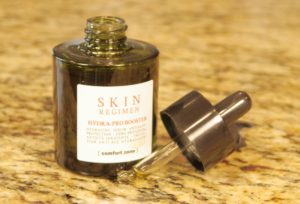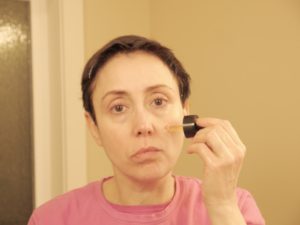Serums
 Open any beauty blog, magazine or product lover’s medicine cabinet, and you’re sure to see the latest must-have skin serum popping up right between the cleanser and moisturizer. But what exactly is all the hype about…and should you start to incorporate serums into your skincare regimen?
Open any beauty blog, magazine or product lover’s medicine cabinet, and you’re sure to see the latest must-have skin serum popping up right between the cleanser and moisturizer. But what exactly is all the hype about…and should you start to incorporate serums into your skincare regimen?
According to dermatologist Adam Geyer, “As people have become more aware and knowledgeable about their skin care routine, layering has become increasingly prevalent. By using a serum, people are able to intensify the strength of their regimen or round out the ingredients they are applying to their skin to provide a more comprehensive approach to anti-aging and hydration.” Serums are usually formulated with a higher concentration of active ingredients, so that only a few drops are needed to cover the entire face. The texture is usually lighter than a moisturizer, which allows it to be used as a stand-alone product for someone with oilier skin, or used under a moisturizer for someone with normal to dry skin.
 Serums should be applied twice daily. They are the first products that should be applied to the skin after cleansing and toning. A sunscreen should be applied over the serum in the morning, and a moisturizer appropriate for an individual’s skin type should be used over the serum at night. It should be massaged thoroughly into the skin.
Serums should be applied twice daily. They are the first products that should be applied to the skin after cleansing and toning. A sunscreen should be applied over the serum in the morning, and a moisturizer appropriate for an individual’s skin type should be used over the serum at night. It should be massaged thoroughly into the skin.
Which product should you choose? The answer depends on your objective. There are many different types of serums, and both the active ingredients and the texture of the serum can provide different functions and benefits. Serums formulated in a water base tend to be best suited for those with oily skin. Serums with a richer texture, or formulated with oils, tend to work well for those with drier skin. However, it is really the combination of active ingredients that defines the serum – with the main six categories being peptides, retinol, growth factors, antioxidants, alpha and beta hydroxyl acids, and botanicals.
 Antioxidant rich serums (e.g. Vitamin C) tend to work well at protecting skin from pollution and UV radiation that we are all exposed to during the day, making them ideal for application under a sunscreen in the morning. These serums work to protect the skin, as well as improve the evenness of the skin tone, as well as reduce the number and depth of facial wrinkles. Serums rich in peptides can help to boost collagen and elastin production and help restore firmness to the skin. Serums formulated with retinol can help accelerate cellular renewal. Retinol can brighten the skin and make it appear more radiant and smooth, but careful to not over-apply these serums as they can have a tendency to irritate the skin if applied too liberally. Those serums rich in essential oils and Omega-3 fatty acids can help the skin to repair itself overnight and make sure that the skin’s barrier function is working at its best.
Antioxidant rich serums (e.g. Vitamin C) tend to work well at protecting skin from pollution and UV radiation that we are all exposed to during the day, making them ideal for application under a sunscreen in the morning. These serums work to protect the skin, as well as improve the evenness of the skin tone, as well as reduce the number and depth of facial wrinkles. Serums rich in peptides can help to boost collagen and elastin production and help restore firmness to the skin. Serums formulated with retinol can help accelerate cellular renewal. Retinol can brighten the skin and make it appear more radiant and smooth, but careful to not over-apply these serums as they can have a tendency to irritate the skin if applied too liberally. Those serums rich in essential oils and Omega-3 fatty acids can help the skin to repair itself overnight and make sure that the skin’s barrier function is working at its best.
Skin care 101 continues with Moisturizing
